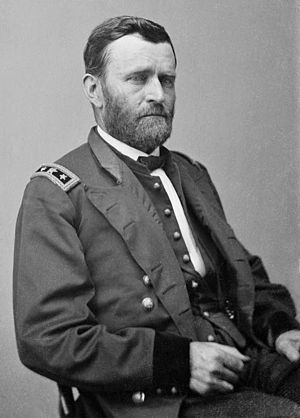 Image of Ulysses S. Grant via Wikipedia
Image of Ulysses S. Grant via WikipediaOn Friday, September 6, 1861, Union troops under Brigadier General Ulysses S. Grant occupied Paducah, Kentucky, at the confluence of the Ohio and Tennessee Rivers, without resistance. This move was in response to the Confederate occupation of Columbus, Kentucky on September 3.
Kentucky's neutrality would have been violated in any case. Major General John Frémont, the commander of the Union Department of the West, had ordered Grant to occupy Columbus as soon as possible. While Confederate Major General Leonidas Polk didn't know about those orders, he had beaten Grant to the punch, but had unleashed a firestorm in Kentucky against the Confederacy by invading the state first.
Grant issued a proclamation to the people of Kentucky:
"I have come among you not as an enemy, but as your fellow-citizen. Not to maltreat or annoy you, but to respect and enforce the rights of all loyal citizens. An enemy, in rebellion against our common Government, has taken possession of, and planted its guns on the soil of Kentucky, and fired upon you. Columbus and Hickman are in his hands. He is moving upon your city. I am here to defend you against this enemy, to assist the authority and sovereignty of your Government. I have nothing to do with opinions, and shall deal only with armed rebellion and its aiders and abettors. You can pursue your usual avocations without fear. The strong arm of the Government is here to protect its friends and punish its enemies. Whenever it is manifest that you are able to defend yourselves and maintain the authority of the Government and protest the rights of loyal citizens I shall withdraw the forces under my command."
Polk's invasion of Kentucky was a major political blunder, but he also committed a strategic blunder. He had planned to occupy Paducah as well, but had moved too slowly and let Grant take the town. With Columbus, the Confederates could block the Mississippi with their big guns on the high bluffs, but Grant's occupation of Paducah gave the Federals another avenue for a Southern invasion: the Tennessee River. Grant would soon occupy Smithland, opening up the Cumberland River as well.
Kentucky Governor Beriah Magoffin would demand that both sides withdraw from Kentucky soil, but the state legislature would demand that only the Confederates withdraw, and would invite the Federals to give the state "that protection against invasion which is granted to each one of the states by the fourth section of the fourth article of the Constitution of the United States."
Magoffin vetoed the resolution, but both houses overrode the veto. The General Assembly declared its allegiance to the Union and ordered the United States flag to be raised over the state capitol.

No comments:
Post a Comment